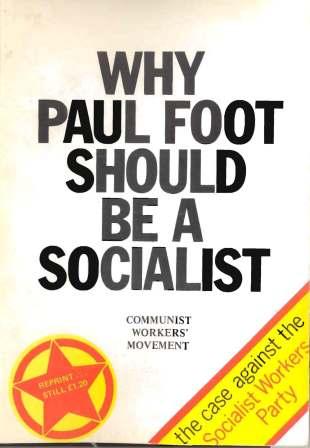
First Published: April 1978
Reprinted: August 1978
Transcription, Editing and Markup: Sam Richards and Paul Saba
Copyright: This work is in the Public Domain under the Creative Commons Common Deed. You can freely copy, distribute and display this work; as well as make derivative and commercial works. Please credit the Encyclopedia of Anti-Revisionism On-Line as your source, include the url to this work, and note any of the transcribers, editors & proofreaders above.
I. THE STATE: PF’s failure to grasp the class nature of the state
A. Nationalisation is the state sector less capitalist than the private Sector?
B. The ’cuts’: should socialists campaign for the welfare of the working class or the welfare of the capitalist state?
C. The machinery of the state
D. Seizure of state power
II. THE LABOUR PARTY: PF’s failure to expose the Labour Party’s role
A. Is the Labour Party less capitalist than the Tory Party?
B. The history of the Labour Party: an example of how PF “straddles the barrier of past and present”
C. The Labour Party and the labouring masses today
D. The Lahour Party: deadly enemy of the working class
III. THE TRADE UNIONS: Are trade union politics the same thing as socialist politics?
A. ’Doing something’ versus ’What is to be done?’; theory and practice in the SWP
B. Trade unions are not revolutionary organisations
C. PF, the SWP and the trade unions today
D. Party-building: should socialists build a revolutionary vanguard or just “gaze with awe upon the posteriors” of the masses?
IV. BRITISH SOCIETY TODAY: Who are our enemies? Who are our friends?
A. Defining the bourgeoisie: PF goes into partnership with the Central Statistical Office and William Mickey
B. Whatever happened to the middle class?
C. The proletariat: how PF transforms the greatest class in history into a flock of sheep
D. Britain: an imperialist society
A. The collapse of British imperialism
B. Britain and the two imperialist superpowers
C. The danger of a new world war
D. Britain and Ireland
E. Revolution in Britain: what stage is it at?
A. ’Eat, drink and be merry’ versus dictatorship of the proletariat
B. Bourgeois individualism versus democratic centralism
C. ’Permanent revolution’ versus the worker-peasant alliance and socialism in one country
D. Trotskyism versus Leninism
E. Syndicalism versus party-building
F. Spontaneism versus proletarian revolution
A. What indeed about Russia?
B. Stalinism: Uncle Joe in historical reality and in Trotskyist mythology
C. Soviet foreign policy: two distinct periods
D. PF on China: a deafening silence
E. Third world revolution
III. THE TWO WORLD OUTLOOKS: Is PF’s outlook that of the proletariat or that of the bourgeoisie?
A. PF’s failure to grasp the role of class struggle in history
B. The hollowness of PF’s opposition to racism
C. PF’s bourgeois culture
D. A “question of attitude”
CONCLUSION: The SWP – where it stands